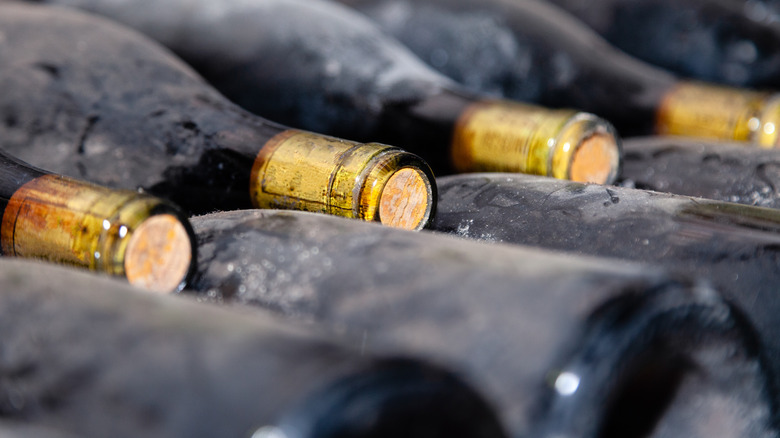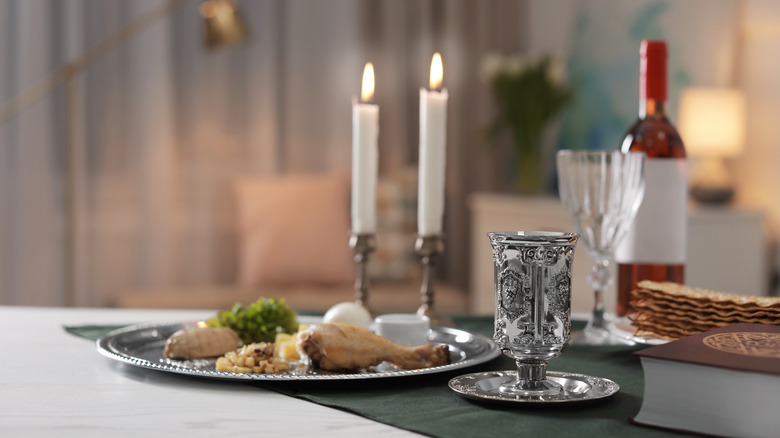What Does The Bible Say About Alcohol Use?
For hundreds of millions of the world's Christians, alcohol use is simply not a big deal. For example, Catholics and other denominations literally include it as part of their worship, drinking a sip of sacramental wine during Holy Communion. Similarly, Catholic monks have been brewing beer for centuries, not only keeping their brew for their personal use, but selling it to the locals. For example, a community of Benedictine monks in New Mexico (Monastery of Christ in the Desert) brews and sells a wide variety of beers, as does Mount Angel Abbey in Oregon.
For a minority, however, alcohol use is either absolutely forbidden, or is at the very least, to be avoided. For example, as State Politics & Policy Quarterly reports, via JSTOR, it was Protestant Christians who were largely behind the Prohibition movement in the early 20th century.
But what does the Bible actually say about alcohol use? As it turns out, the sacred text is all over the place, with some passages condemning it, some promoting it, others treating it neutrally. So muddled is the picture that the Bible paints with regard to alcohol use that Christians remain split on it to this day, although when it comes to Judaism, the attitudes of Jewish teachers are a bit different from those of some Christians.
Some scriptures promote alcohol use, or treat it neutrally
One of the biggest and most important mentions of alcohol use in the Bible comes in the New Testament. In John 2, Jesus performs his first miracle, turning water into wine at a wedding feast. It was top-tier, high-quality stuff: "Everyone brings out the choice wine first and then the cheaper wine after the guests have had too much to drink; but you have saved the best till now," the host told Jesus. Again in the New Testament, in 1 Timothy, traditionally attributed to the Apostle Paul, the writer tells the reader to "Stop drinking only water, and use a little wine because of your stomach and your frequent illnesses."
Other mentions of alcohol are neutral, simply part of the narrative. In the Old Testament, Genesis 27, Jacob and his father share a meal with some wine. Deuteronomy 12 covers the practice of tithing wine. In the New Testament, Matthew 9, and other places in the gospels, Jesus teaches that "[no one pours] new wine into old wineskins. If they do, the skins will burst; the wine will run out and the wineskins will be ruined." And so on.
But the Bible is definitely against drunkenness
While in some passages the Bible treats alcohol consumption neutrally, when it comes to drinking too much — that is, to the point of getting drunk — the Bible is a bit less tolerant. For example, in a couple of passages in the Old Testament, such as Genesis 9 and 2 Samuel 11, episodes of drunkenness end poorly for the people involved. Similarly, a passage in Proverbs 20 warns against being habitually drunk: "Wine is a mocker and beer a brawler; whoever is led astray by them is not wise." A couple of chapters later, the writer compares wine to the bite of a venomous snake.
Over in the New Testament, several passages seem to clearly and unambiguously prohibit drunkenness, such as Romans 13:13: "Let us behave decently, as in the daytime, not in carousing and drunkenness," as well as 1 Corinthians 5:11, and 1 Corinthians 6:10. Elsewhere in the New Testament, writers attempt to help settle cultural differences between teetotaling Christians and those who loved the grape. For example, in Romans 14, the writer tells the reader, "It is better not to eat meat or drink wine or to do anything else that will cause your brother or sister to fall."
How Jews treat alcohol use
Judaism largely takes the broad view that alcohol use is allowed — in much the same way that Catholics and others include wine in their worship, so, to, do Jews for certain occasions — but that it's also a dangerous tool that should be approached with caution.
Writing in Chabad, Menachem Posner asks rhetorically whether wine is a "holy beverage with immense powers," or a tool of destruction that can bring down the mighty. His answer: "a little of both, it seems."
Rabbi Mark Washofsky, in his 2001 book "Jewish Living: A Guide to Contemporary Reform Practice" (excerpted at My Jewish Learning) basically reiterates the same key points: that the Old Testament doesn't forbid alcohol use, that it's a holy sacrament in some contexts, that moderation is key, and that it can be destructive if taken to extremes. "Judaism holds us responsible for failure to treat our health with care and respect," he wrote.
Many Christians see things differently
The attitudes of Christians towards alcohol use range from appeals to moderation, to outright teetotalism. Writing in Core Christianity, Le Ann Trees takes the broad view that the Bible permits alcohol use in moderation, and warns against drunkenness. "Christians have the liberty to enjoy this gift from God within the boundaries of God's moral law ... Those who choose to drink alcoholic beverages must always do so responsibly — doing no harm to others or themselves."
However, writing in Crosswalk, Christy Shipe suggests that the Christian be extremely cautious when considering whether or not to drink. After pointing out some possible dangers from getting drunk, such as a woman being sexually assaulted, she concludes, "I think it is possible to live a godly life and enjoy a small amount of alcohol."
Dr. Vern Charette, writing in his blog, says that for a variety of reasons — the Bible's teachings on drunkenness, our current culture, and the modern alcohol industry among them — teetotaling is the way to go. "My son ... will never see his dad under the influence of anything other than the Spirit of God."




